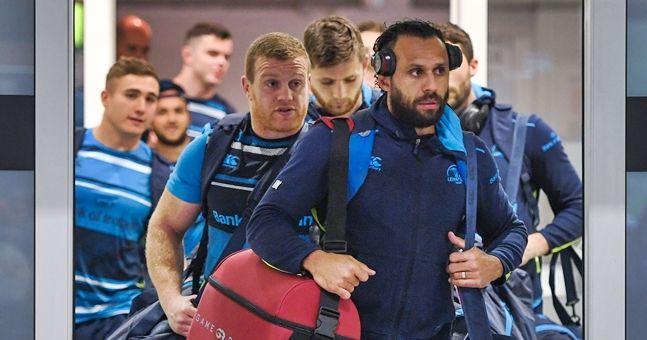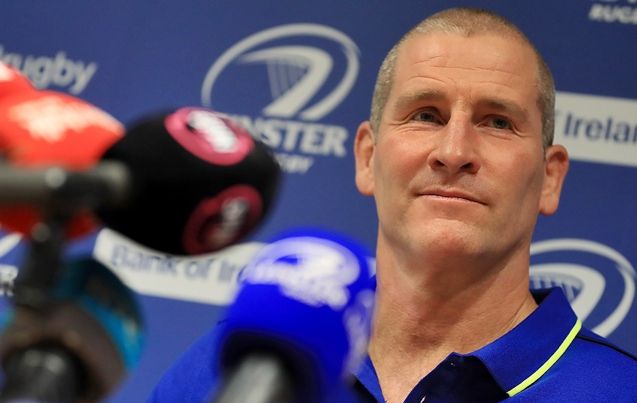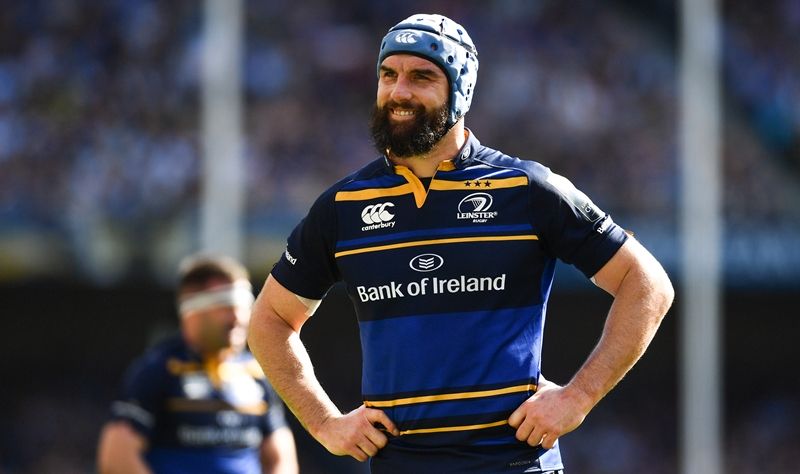Leinster’s players, coaching and backroom staff have taken up most of the first 15 rows on the Aer Lingus EI746 flight from Dublin to Bilbao. Rob Kearney and Sean Cronin sit together near the front while the giant forms of James Ryan and Devin Toner brush off the overhead containers in their window seats.
Rhys Ruddock settles into his seat and takes out a paperback on an arctic explorer, safe in the knowledge that the seat next to him is empty and he may be able to stretch out his 6-foot-3 frame.
Just as the main doors close, however, the lumbering, amiable figure of Michael Bent has been pointed in his direction.
“No. No,” protests Ruddock. “Noooooo.”
The rest of the Leinster squad cheers as Bent makes his way down a few rows and crams himself in beside his fellow forward.
“Sorry mate,” he offers.
“Could be worse,” Ruddock returns.
It could be worse. Leinster could have this weekend off, as they have had for the past six years, but they don’t. They are off to their fourth ever European Cup final and they are in good spirits. They’ve won the other three.

“You can’t win every year, that’s the reality of it.” – Matt O’Connor, June 2015
May 2016 and Ultan Dillane is skittling Kearney brothers for fun at Murrayfield. Tiernan O’Halloran, Matt Healy and Niyi Adeolokun are too much to handle and Robbie Henshaw is playing like a dream beside Bundee Aki.
Leo Cullen, in his first full season as head coach, he is living through a nightmare. Leinster lost five of their six Champions Cup pool games and were effectively eliminated by mid December. The PRO12 is all Leinster had left but Connacht have too much swagger and momentum.
20-10 is the final, generous scoreline. Perhaps O’Connor was right but, then, the Australian managed to win a league title during his two-season stint.
We were given a taste of the power Joe Schmidt wields when O’Connor – a man he publicly and privately clashed with – was given his marching orders a season ahead of schedule. Schmidt may switched from Leinster to Ireland in June 2013 but he was clearly unhappy at the stagnation that had set in. For Ireland to be strong, Leinster needed to be a driving force. Munster, Connacht and Ulster would still contribute but the IRFU needed Leinster to get their act together.
Leinster were no longer a team to inspire dread in Europe. They had their tickets punched and gave it a rattle but Toulon, first, and then Saracens were the dominant forces on the continent.
Cullen could not finish off a tough season with a trophy but help would soon be on the way.

‘Not today lads’
There’s a great story about Stuart Lancaster and how he once got his England team ready for a St Patrick’s Day date with Ireland at Twickenham.
The Cumbrian native brought in veterans of the Iraq War that had lost limbs and suffered other devastating injuries in service of their country. These veterans – soldiers, airforce and navy – spoke of what it meant to fight for, and represent, their country and how that passion was undimmed by the damage their bodies’ received.
It was pomp, pageantry and jingoism but it hit home with several players.
Declan Kidney, Ireland’s then head coach, told his team, just before they went out on the pitch, ‘Not today lads. Not on St Patrick’s Day.” That was it. Ireland lost 30-9.
That victory over Ireland and a win over the All Blacks, six months later, were the highlights of Lancaster’s England reign. Calcutta Cup victories over Scotland aside, his time in charge did not coincide with big trophy wins. The biggest – the World Cup – saw England falter badly and become the first host nation to be eliminated at the group stage.
Lancaster lost his job and his reputation was severely damaged.
Cullen sat at Tallaght Stadium in August 2016 and admitted he needed help. He needed a hands on coach and one that could help several of Leinster’s up-and-coming players kick on to be senior stars. Lancaster’s availability and willingness to go from national coach to a cog in the Leinster wheel was a God-send. His time at Leinster would restore that reputation and lead him to the brink of his best achievement yet.
Dan Leavy is a ball of energy. Up and down.
The Leinster flanker is not one for sitting still. Up until the Leinster squad boarded their flight, Leavy was strolling around the departure terminal at Dublin Airport. On the plane, as soon as the seat-belt lights go off he is on his feet, chatting, slagging and holding court near the front.
23-years-old and confident as they come, Leavy is the embodiment of the young charges in Leinster’s squad.
At the beginning of this season, Leavy was struggling to get a look in for his province. Josh van der Flier and Rhys Ruddock were hogging the No.7 jersey and Sean O’Brien would surely come back in for the business stage of the season.
And then professional rugby did what it so often, and so callously, does. Bodies dropped and rehabs began. Leavy got his chance by staying fit and hungry. As soon as he got a run at openside, for Ireland then Leinster, he did not look back. Superb performances in the Six Nations, against France, Wales, Scotland and England, were followed by tour-de-force outings in the Champions Cup against Saracens and Scarlets.
“I think I’m in the position I am for a reason,” he declared before he faced Italy early this season. “I don’t need to go out and reinvent the wheel and doing drop goals and stuff like that. Just keep doing what I’m doing, work hard and hopefully reap the rewards.”
Those rewards have been reaped and Leavy is not done yet. Along with James Ryan, Andrew Porter, Joey Carbery, Jordan Larmour, Garry Ringrose, Leavy is part of a young Leinster cohort to experience Grand Slam glory before they turn 25. “They don’t know any different,” Johnny Sexton says.
Leavy, Porter and Tadhg Furlong [25 and change] have all raved about the belief Lancaster has brought to them and the technical changes he has implemented in their respective games since he took over as senior coach.
Cullen looks after the bigger picture but still mucks in with the forwards every now and then. Lancaster is hands on, across the deck, and it is no surprise to see so many young players coming through and making a mark under his watch.
The results have been incredible – Glasgow 55-19, Saracens 30-19, Scarlets 38-16 – but they all know it will mean nothing without silverware.
***
Johnny & Joey
If anyone had any doubts about Joey Carbery and Johnny Sexton’s constant assertions that they get on well, witnessing them hanging out together in Dublin Airport will have settled them.
There is time to kill before gate numbers are announced and the duo, Leinster emblazoned back-packs in place, saunter into WH Smith together and veer straight towards the best-sellers.
One could call them rivals for the No.10 jersey but Sexton is a country mile ahead. He is the master and Carbery is the apprentice. Right now it’s working perfectly.
That confidence in himself, and of his status, is perhaps what makes Sexton so supportive of Carbery. At half-time of Ireland’s Grand Slam-clinching win over England – on St Patrick’s Day as it happens – Sexton waited by the tunnel to congratulate the 22-year-old on his cameo. Having replaced Sexton during his Head Injury Assessment, Carbery had taken the attack to England and kicked a fantastic conversion.
Credit: ITVCarbery has the potential to be a great Leinster 10 but he may have to settle for being an Ulster 10 for a while. Sexton insists he may even stick around until he is 40, like his new sporting idol Tom Brady. Maybe the nerves will get better by then…
“Training and going kicking. They help take your mind off stuff. They distract you and prepare you at the same time, which sounds at bit strange. I find that is when I’m at my calmest but it’s only when you get home and you’ve got time to yourself that you worry about that. The older you get, the nerves get worse but probably how you deal with them gets better.”
One of the main reasons Leinster are where they are this season is because of Sexton. Like Conor Murray, his half back partner with Ireland, Sexton is so good now that you just take his excellent performances for granted.
Sexton tore Saracens then Scarlets to shreds in a role that would have surely impressed Brady, the classy Patriots quarterback. Asked about winning his fourth ever European Cup winners’ medal, Sexton admits his mind does wander. But it’s not about personal glory – the first ones he touches on when he talks about winning the cup are Isa Nacewa and injured teammates like O’Brien, van der Flier and others.
He is the main man but he is a team man first.
The next great import
Cullen was asked, ahead of the final against Racing 92, about how tough it must have been to let Kiwi winger James Lowe know he would not be playing.
“It’s not just James,” he replied. “There’s a whole host of players that we had difficult conversations with this week. We’ve used 37 players in the eight Champions Cup games so far… It takes a huge amount to get to this stage.”
Leinster have gone deeper than most because they have a squad more capable and bigger than most. Their academy system is marvelled at the world over and, as Cullen noted in Bilbao, the province prides itself on producing world-class, home-grown talent.
Still, many of Leinster’s greatest victories have been achieved with inspirational foreign imports playing huge parts in getting over the line. Brad Thorn, Rocky Elsom, Stan Wright, Felipe Contepomi and more. Isa Nacewa is a living legend at the club and his un-retirement is a big part of this Leinster side rediscovering what it takes to be winners – to be feared – again.
The capture of Scott Fardy, though, has been absolutely vital. Signed from the Brumbies, we were told, as a lock, Fardy is back where he shone on the world stage – as a blindside flanker.

He came to Leinster to see more of the world, to experience a new team culture, to learn more about himself and his game and, more importantly, to win. On Saturday night in Bilbao, he will be a pivotal figure in a competition he admits he saw little of over the past two decades:
“I wouldn’t have watched any of the other [European Cup] finals. You’d be lucky to find it on telly in Australia. I probably didn’t realise how big a competition it was before coming here… I didn’t realise how big the crowds were and how pumped people were for the actual competition. It’s been pretty special. It’s like a World Cup every year.”
Fardy has been a revelation for Leinster this season. From the second row and the back row, he has been a talisman for the Leinster forwards and his team.
On so many occasions – his two tries against Glasgow and his block -down on Gareth Davies in the semi – Fardy has been the man to make things happen for Leinster. If Leinster beat Racing, Fardy would be favourite to win EPCR Player of the Year.
Such an accolade may bring him to the fore but that’s not his character.
We arrive at Bilbao Airport and the Leinster squad emerge into the arrivals hall with Isa Nacewa leading the way, as is only right. Behind him is Sean Cronin then a crop of younger players – Larmour, Ryan, Barry Daly and Ross Byrne. Devin Toner is right in the middle and, at 6-foot-10, will never be missed.
Fardy takes up the rear and stares ahead as the cameras flash and the signs are waved.
One of a number and one hell of a number.
Here come the team nobody wants to play.






































